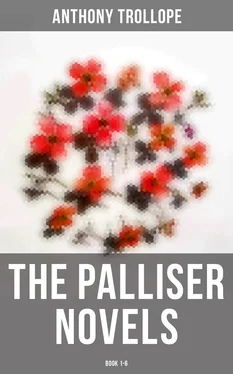It was thus that he argued with himself; but yet he knew,—knew as well as the reader will know,—that he was going to do that which he had no right to do. It might be very well for him to wait,—presuming him to be successful in his love,—for the opening of that oyster with his political sword, that oyster on which he proposed that they should both live; but such waiting could not well be to the taste of Lady Laura Standish. It could hardly be pleasant to her to look forward to his being made a junior lord or an assistant secretary before she could establish herself in her home. So he told himself. And yet he told himself at the same time that it was incumbent on him to persevere.
"I did not expect you in the least," said Lady Laura.
"And yet I spoke very positively."
"But there are things as to which a man may be very positive, and yet may be allowed to fail. In the first place, how on earth did you get home?"
"Mr. Kennedy got me a pony,—Donald Bean's pony."
"You told him, then?"
"Yes; I told him why I was coming, and that I must be here. Then he took the trouble to come all the way off the mountain to persuade Donald to lend me his pony. I must acknowledge that Mr. Kennedy has conquered me at last."
"I am so glad of that," said Lady Laura. "I knew he would,—unless it were your own fault."
They went up the path by the brook, from bridge to bridge, till they found themselves out upon the open mountain at the top. Phineas had resolved that he would not speak out his mind till he found himself on that spot; that then he would ask her to sit down, and that while she was so seated he would tell her everything. At the present moment he had on his head a Scotch cap with a grouse's feather in it, and he was dressed in a velvet shooting-jacket and dark knickerbockers; and was certainly, in this costume, as handsome a man as any woman would wish to see. And there was, too, a look of breeding about him which had come to him, no doubt, from the royal Finns of old, which ever served him in great stead. He was, indeed, only Phineas Finn, and was known by the world to be no more; but he looked as though he might have been anybody,—a royal Finn himself. And then he had that special grace of appearing to be altogether unconscious of his own personal advantages. And I think that in truth he was barely conscious of them; that he depended on them very little, if at all; that there was nothing of personal vanity in his composition. He had never indulged in any hope that Lady Laura would accept him because he was a handsome man.
"After all that climbing," he said, "will you not sit down for a moment?" As he spoke to her she looked at him and told herself that he was as handsome as a god. "Do sit down for one moment," he said. "I have something that I desire to say to you, and to say it here."
"I will," she said; "but I also have something to tell you, and will say it while I am yet standing. Yesterday I accepted an offer of marriage from Mr. Kennedy."
"Then I am too late," said Phineas, and putting his hands into the pockets of his coat, he turned his back upon her, and walked away across the mountain.
What a fool he had been to let her know his secret when her knowledge of it could be of no service to him,—when her knowledge of it could only make him appear foolish in her eyes! But for his life he could not have kept his secret to himself. Nor now could he bring himself to utter a word of even decent civility. But he went on walking as though he could thus leave her there, and never see her again. What an ass he had been in supposing that she cared for him! What a fool to imagine that his poverty could stand a chance against the wealth of Loughlinter! But why had she lured him on? How he wished that he were now grinding, hard at work in Mr. Low's chambers, or sitting at home at Killaloe with the hand of that pretty little Irish girl within his own!
Presently he heard a voice behind him,—calling him gently. Then he turned and found that she was very near him. He himself had then been standing still for some moments, and she had followed him. "Mr. Finn," she said.
"Well;—yes: what is it?" And turning round he made an attempt to smile.
"Will you not wish me joy, or say a word of congratulation? Had I not thought much of your friendship, I should not have been so quick to tell you of my destiny. No one else has been told, except papa."
"Of course I hope you will be happy. Of course I do. No wonder he lent me the pony!"
"You must forget all that."
"Forget what?"
"Well,—nothing. You need forget nothing," said Lady Laura, "for nothing has been said that need be regretted. Only wish me joy, and all will be pleasant."
"Lady Laura, I do wish you joy, with all my heart,—but that will not make all things pleasant. I came up here to ask you to be my wife."
"No;—no, no; do not say it."
"But I have said it, and will say it again. I, poor, penniless, plain simple fool that I am, have been ass enough to love you, Lady Laura Standish; and I brought you up here to-day to ask you to share with me—my nothingness. And this I have done on soil that is to be all your own. Tell me that you regard me as a conceited fool,—as a bewildered idiot."
"I wish to regard you as a dear friend,—both of my own and of my husband," said she, offering him her hand.
"Should I have had a chance, I wonder, if I had spoken a week since?"
"How can I answer such a question, Mr. Finn? Or, rather, I will, answer it fully. It is not a week since we told each other, you to me and I to you, that we were both poor,—both without other means than those which come to us from our fathers. You will make your way;—will make it surely; but how at present could you marry any woman unless she had money of her own? For me,—like so many other girls, it was necessary that I should stay at home or marry some one rich enough to dispense with fortune in a wife. The man whom in all the world I think the best has asked me to share everything with him;—and I have thought it wise to accept his offer."
"And I was fool enough to think that you loved me," said Phineas. To this she made no immediate answer. "Yes, I was. I feel that I owe it you to tell you what a fool I have been. I did. I thought you loved me. At least I thought that perhaps you loved me. It was like a child wanting the moon;—was it not?"
"And why should I not have loved you?" she said slowly, laying her hand gently upon his arm.
"Why not? Because Loughlinter—"
"Stop, Mr. Finn; stop. Do not say to me any unkind word that I have not deserved, and that would make a breach between us. I have accepted the owner of Loughlinter as my husband, because I verily believe that I shall thus do my duty in that sphere of life to which it has pleased God to call me. I have always liked him, and I will love him. For you,—may I trust myself to speak openly to you?"
"You may trust me as against all others, except us two ourselves."
"For you, then, I will say also that I have always liked you since I knew you; that I have loved you as a friend;—and could have loved you otherwise had not circumstances showed me so plainly that it would be unwise."
"Oh, Lady Laura!"
"Listen a moment. And pray remember that what I say to you now must never be repeated to any ears. No one knows it but my father, my brother, and Mr. Kennedy. Early in the spring I paid my brother's debts. His affection to me is more than a return for what I have done for him. But when I did this,—when I made up my mind to do it, I made up my mind also that I could not allow myself the same freedom of choice which would otherwise have belonged to me. Will that be sufficient, Mr. Finn?"
"How can I answer you, Lady Laura? Sufficient! And you are not angry with me for what I have said?"
Читать дальше












